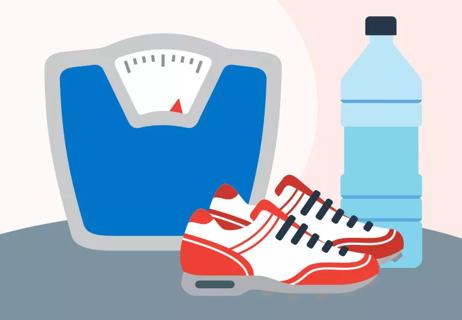Hormones, water retention and even exercise can play a part in daily weight changes

Last week, your favorite jeans fit fine. This week, they feel tight in all the wrong places. You hop on the scale and notice an unexplained rise in numbers from the day before. Is this a cause to worry? Or is it just part of your normal weight fluctuation?
Advertisement
Cleveland Clinic is a non-profit academic medical center. Advertising on our site helps support our mission. We do not endorse non-Cleveland Clinic products or services. Policy
“The scale is a horrible barometer of behavior change,” points out Leslie Heinberg, PhD. “You can do everything right today — you can exercise, you can have great intake that really would make any dietitian thrilled — but then, you get on the scale, and you’re up 2 pounds.”
While this can be frustrating, it’s most likely just a part of your body’s normal process of weight management. If you’re keeping track of your weight, it’s important to realize that the scale can’t always tell the whole story.
Dr. Heinberg explains what weight fluctuation is — and why it happens.
Yes, it's entirely normal for your weight to fluctuate.
Daily fluctuations of a few pounds are quite common and no cause for concern. Short-term fluctuations are usually due to fluid retention and longer-term fluctuations can also occur due to lifestyle changes, such as changes in exercise routines or stress levels.
But Dr. Heinberg says if you’re noticing drastic weight changes without an apparent cause, it’s worth discussing with a healthcare provider to rule out any underlying health concerns.
Even for people within a healthy weight range, the average fluctuation is a window of about 5 to 6 pounds per day (2 to 3 lbs in either direction). For those who aren’t accustomed to the normal ups and downs of their weight, this number might sound discouraging. But everyone is different. Your weight fluctuation will depend on different factors like your diet and physical activity.
Advertisement
You’d be surprised at how much can impact your weight fluctuation.
“Weight fluctuation can be a result of factors such as hormones, fluid retention or even constipation,” Dr. Heinberg shares.
Here are some common reasons for weight fluctuation:
Water retention is the most common cause of short-term weight fluctuations. This is when your body holds onto more water than usual. Think of it like a sponge soaking up water and holding onto it.
For instance, after a meal high in carbohydrates or sodium, your body might retain more water temporarily, causing a slight increase in weight. This can also make you feel a bit swollen or bloated. High-sodium foods, hormonal changes, medications and certain medical conditions can all cause your body to retain water, leading to a temporary weight gain.
Consuming a large meal or foods high in carbohydrates can cause temporary weight gain while your body digests your meal. Everything you eat or drink causes a small fluctuation in weight while it passes through your body. On the flip side, if you’re eating less due to illness or a change in diet, this can lead to weight fluctuations as well.
Don’t forget, muscle mass contributes to our weight, too. That’s why exercise, particularly strength training, can lead to short-term weight gain due to increased muscle mass. But over time, it can contribute to overall weight loss and improved body composition.
People who live with menstrual cycles, pregnancy or menopause may experience weight fluctuation due to hormonal changes. This can cause temporary weight changes due to water retention or changes in metabolism.
High stress levels can also influence weight fluctuation. Some people tend to eat more or less when stressed, leading to weight changes. Stress also affects hormone levels, which can impact metabolism and, therefore, your weight.
Certain medications can affect your metabolism, increase your appetite and, in turn, cause your weight to fluctuate.
This includes medications like:
Before starting a new medication, be sure to talk to your healthcare provider about any weight-related symptoms you can expect.
Changes in lifestyle, such as traveling, altered sleeping patterns or adjustments to your daily routine, can affect weight due to changes in eating habits, physical activity and water retention.
It’s totally normal for our weight to go up and down. This can happen because of the food we eat, how much water our body holds or even how active we are.
If your weight changes a lot suddenly and you’re not sure why, it’s a good idea to talk to a healthcare provider to make sure it isn’t a sign of something more serious. Otherwise, small changes in weight are totally normal and happen to everyone every day.
Advertisement
“Writing weight down can help people follow trends over time,” Dr. Heinberg suggests. “If you notice that your weight is consistently up after days or weeks, then it’s easier to make course corrections.”
Advertisement
Learn more about our editorial process.
Advertisement

No one diet is right for everyone — but the Cleveland Clinic Diet app meets your personalized needs

Constantly thinking about food can make it hard to maintain a healthy weight and can lead to other health issues

Having obesity brings long-term health risks no matter your fitness level

Consistency is a big part of weight tracking

Maintaining a healthy weight, focusing on exercise and eating a well-balanced diet can improve your overall metabolic health

Overweight and obesity increase your CKD risk, and may speed disease progression in people who have the condition

There’s no set timeline, as factors like dosage, diet, exercise and stress levels can impact the effectiveness of the medication

It depends on factors like your age, activity level and if you want to maintain, lose or gain weight

Wearing a scarf, adjusting your outdoor activities and following your asthma treatment plan can help limit breathing problems

Your diet in the weeks, days and hours ahead of your race can power you to the finish line

When someone guilt trips you, they’re using emotionally manipulative behavior to try to get you to act a certain way